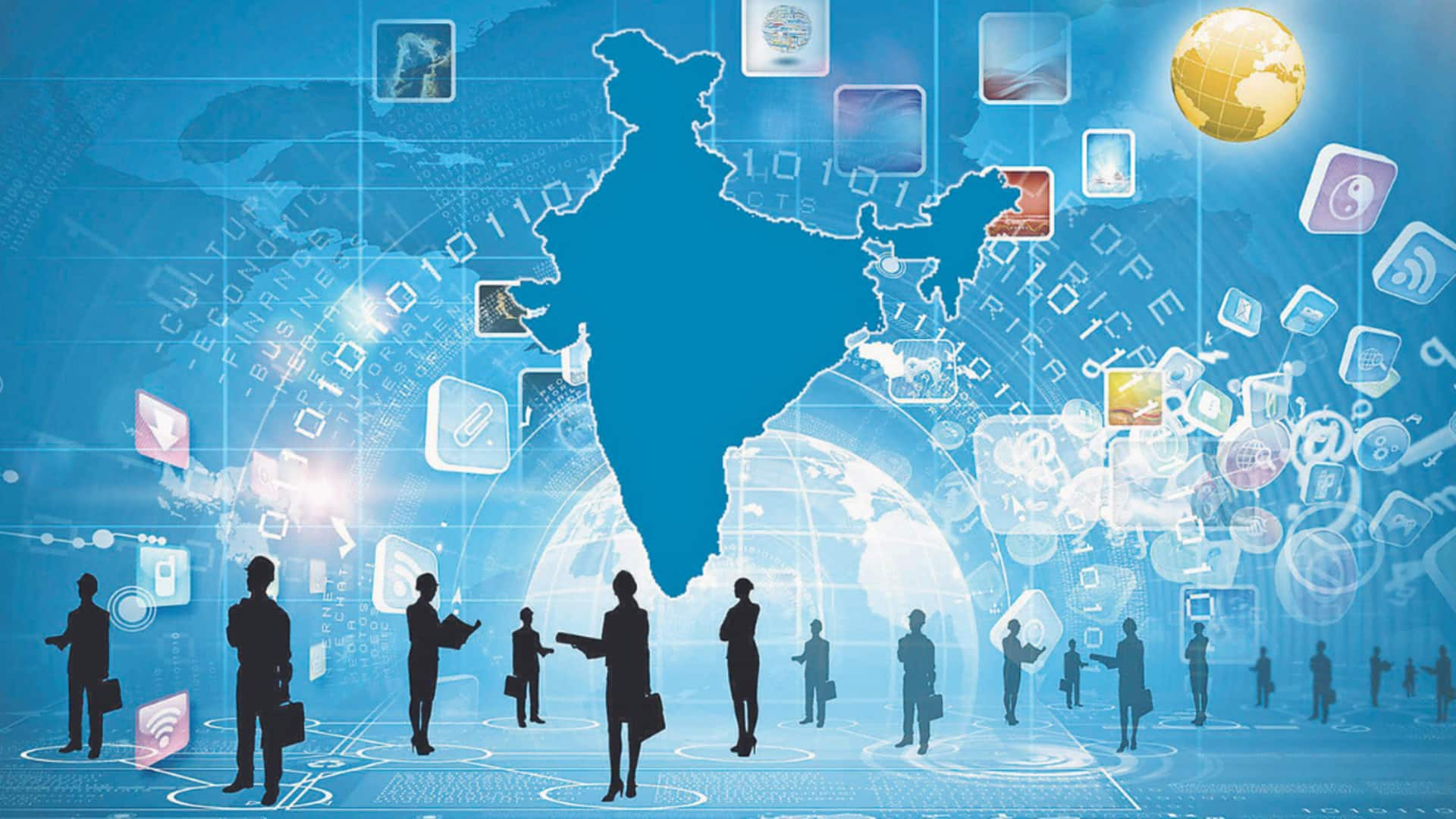
India's digital transformation in 2023: Advancements in infrastructure and initiatives
What's the story
The year 2023 marked a digital revolution for India. The Indian government introduced several initiatives under 'Digital India,' to transform the nation's digital landscape.
Broadband bled into remote corners, markets buzzed with AI and cybersecurity, and contactless payments remained the most preferred method of transaction.
These remarkable advancements played a crucial role in delivering essential services to citizens throughout the year.
Here, we discuss various digital programs and initiatives introduced under Digital India initiative.
Details
Let's explore the term 'Digital India' first
Digital India is an initiative launched by the Government of India to transform the country into a digitally empowered society and knowledge economy.
The initiative was announced by Prime Minister Narendra Modi on July 1, 2015, with the vision to leverage digital technologies for the nation's overall development.
The Digital India campaign focuses on various areas to bring about comprehensive and inclusive growth.
It includes infrastructure development, digital payments, broadband connectivity, digital literacy, and e-governance to name a few.
More
It's a multi-faceted program with numerous initiatives
Digital India doesn't have a single defined number of initiatives.
It operates as a comprehensive ecosystem with interconnected ongoing and upcoming programs and developments across various domains, aiming to drive India's digital transformation.
The endeavors demonstrate a dedication to harnessing technology to enhance service delivery, empower citizens, and propel India toward a more digitally inclusive future.
Let's have a glimpse into the several digital initiatives undertaken by the Indian government in 2023.
#1
AI-driven advancements for Aadhaar-based face authentication
India's digital journey started with Aadhaar, which now provides around 1.3 billion citizens with a digital ID.
At the Global Fintech Festival 2023 in September, the Unique Identification Authority of India (UIDAI) introduced an AI-driven Aadhaar advancement.
Under the banner of "Reimagine Aadhaar," UIDAI showcased an enhanced Face Authentication capability for Aadhaar, leveraging in-house developed AI and ML technologies.
This will be used for attendance systems for beneficiaries of MGNREGA and customer acquisition process by banks.
#2
Digital India Act to tackle growing issues in digital ecosystem
On March 9, 2023, Rajeev Chandrasekhar, the Minister of State for the Ministry of Electronics and Information Technology (MeitY), held a consultation to announce Digital India Act (DIA), replacing the Information Technology Act of 2000.
The yet-to-be-implemented legislation is currently in the draft stage. It aims to establish a forward-looking legal framework for the country's expanding digital ecosystem.
DIA will regulate the issues pertaining to consumer protection, electronic contracts, and the moderation of content on social media platforms.
#3
Digital Personal Data Protection Act
The Digital Personal Data Protection Act, 2023 (DPDP Act), a significant legislative milestone, received Presidential approval in August this year.
The DPDP Act defines personal data as any information by which an individual can be identified. It makes consent mandatory for data processing and establishes a Data Protection Board (DPB) to monitor compliance and address grievances.
Data fiduciaries (companies) in India may be fined up to Rs. 250 crore for misuse or failure to safeguard user data.
#4
Broadband extended to remote corners, 5G coverage witnessed major milestone
The Indian government continued to extend the reach of BharatNet rural broadband connectivity project, aiming to offer broadband access to all telecommunications service providers in the country.
BharatNet stands as one of the largest rural telecom initiatives globally, encompassing villages spread across various states and union territories in India.
Likewise, India's 5G coverage significantly expanded in 2023, witnessing one of the fastest deployments globally.
Over 100 million Indians are now using 5G, thanks to telecom operators like Jio and Airtel.
#5
UPI solidified its position for cashless transactions
The influence of the Unified Payments Interface (UPI) on India's payment system in 2023 has been massive and transformative.
UPI emerged as the undisputed king, holding over 47% of the market share, as of September 2023, according to Statista.
Overall cashless transactions skyrocketed, as nearly 114 billion digital payments were recorded in FY 2023.
In October 2023 alone, 11 billion transactions worth Rs. 17.16 lakh crore took place via UPI, as noted by the National Payments Corporation of India (NPCI).
#6
Major platforms adopted UPI Lite in 2023
In September 2022, NPCI and the Reserve Bank of India (RBI) introduced UPI Lite, a streamlined iteration of the initial UPI payment system.
It was adopted by Paytm, PhonePe, and Google Pay earlier this year.
UPI Lite serves as a payment alternative enabling users to conduct transactions of up to Rs. 200.
The payment system is specifically tailored for the efficient processing of low-value transactions.
Recently, NPCI introduced a more improved version named UPI Lite X that works without internet.
#7
Skill India Digital for youth training
In September 2023, Union Minister for Skill Development and Entrepreneurship, Dharmendra Pradhan, launched the Skill India Digital (SID) initiative to revolutionize skill development for Indian youth.
SID ensures that youth in India are trained at the highest global standards, in order to enable them to access employment opportunities abroad.
As a key component of India's Digital Public Infrastructure (DPI), SID aims to improve access to high-quality skill development, relevant opportunities, and entrepreneurial assistance for all Indians.